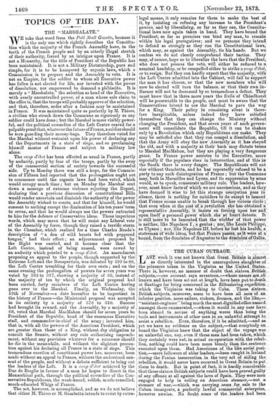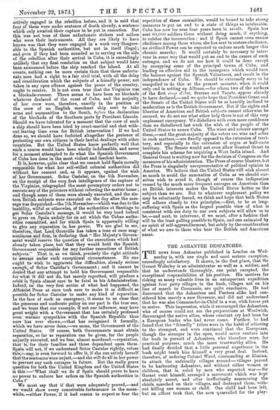THE CUBAN OUTRAGE. ''-`1" in .9 r-cfam 7 T AST week it
was not known that Great BritaiTin 4; 1.1 as directly interested in the unscrupulous tierdni the, prisoners taken in the Virginias as the United, tbated, There is, however, no manner of,doubt that airtteen
--
subjects,—one account saya seventeen,whessinames are all known and have been set out at length, havebnpp put to death , at Santiago for being concerned in the Blibusiterbig.exodition which the Virginius was taking to Cuba. Thesei sixteen British subjects, moreover, seem to have been all men of an inferior position, mere sailors, stokers, firemen, and the "assistant-engineer" being much, the most dignified office named amongst, those enumerated,--whom it would in any case have been absurd to accuse of , anything worse than being the tools and instruments of other men in an unlawful attempt to assist a rebellion. Even, therefore, if it be adraitted,—and as yet we have no evidence on the subject,—that everybody on board the Virginius knew that the object of, the voyage was an unlawful wig, nay, even if these, men had been taken„,yillich they certainly were not, in actual co-operation with rebel lion, nothing could have been more bloody than tliementence executed upon them. Had Americans of the hire,socusl„posi- tion,—mere followers of abler leaders,—been caught in Ireland during the Fenian insurreotion in the very apt of, aiding the, rebellion, it would never have occurred, to Great. Britain to put them to death. But in point of fact, it is hardly conceivable that these sixteen British subjects could have been proved guilty of any offence at all against the laws of Spain. They were-men engaged to help in sailing an American steamer,—not a steamer of war,--which was carrying arms for sale to the Cuban insurgents, a perfectly lawful commercial enterprise, however unwise. No doubt some of the leaders had been
actively engaged in the _rebellion before, and it is said that four of them were under sentence of death already, a sentence which only awaited their capture to be put in execution. But this was not true of these unfortunate stokers and sailors who were their instruments. All they are likely to have known was that they were engaged in a work verrdisagree- able to the Spanish authorities, but not in itself illegal ; and even if they had been sounded as to serving on the side of the rebellion after their arrival in Cuba, it is exceedingly unlikely that any final resolution on that subject would have been announced before the ship reached the island. At all events, nothing can be more certain than that these unfortu- nate men had a right to a fair civil trial, with all the delay and consideration which the subjects of a friendly power, not taken in any open offence against the peace of the country, ought to receive. It is not even true that the Virginias was a blockade-runner. There seems to have been no blockade whatever declared , of the coast of Cuba, and the majority of her crew were, therefore, exactly in the position of the crew of an English merchant ship sent to take arms and ammunition to the South, before the declaration of the blockade of the Southern ports by President Lincoln. Sheuld we have tolerated for a moment that the crew of such a ship should have been tried by court-martial and shot with- out leaving time even for British intervention ? If we had done so, we should have forfeited altogether the pretence of protecting our own citizens in their lawful dealings with other countries. , But the. United States knew perfectly well that such a course would have been wholly indefensible, and never
for a moment attempted to do what the Spanish Government of Calm has done in the most violent and insolent haste. r,.however, quite clear that we cannot Spain morally resnirsible for what her self-willed colonial authorities did without her consent and, as it appears, against the wish of her Government. Senor Castelar,-on the 6th November, on,,the receipt of the very first intelligence of the capture of the Virginius, telegraphed the moat peremptory orders not to execute any of the prisoners without referring the matter home ; and though some of them, were already executed, and the six- teen British subjects were executed on the day after the mes- sage was despatched—the 7th Novaixtber—which was due to the ii4aWity, wilful or otherwise, of the authorities at Santiago to pi `Senor. Castelar's message, it would be' very hard indeed to press on Spain unduly#or an act, which the Cuban autho- rities committed, and for Which Spain is apparently willing to give any reparation in her power. We are glad to see, therefore, that Lord Granville has taken a tone at once mag- nanimous and firm, in declaring that " Her Majesty's Govern- ment would reserve the question of the executions which had already taken place, but that they would hold the Spanish Government responsible for any-further executions of British subjects." That is, as we think, precisely the right attitude to assume under such exceptional circumstances. No one ought to wish. to aggravate the difficulties, already serious entitle:1, of Seller 'Castelar's Government ; and it cannot be denied-that any attempt to hold his Government responsible for whiit'it did not do, but merely regretted, will produce a crisikin'Eliain almost sure to 'be fatal to his Administration. ed the very -first notice of what had happened, the Alfcitaist Press at once took care to make it as difficult as postale for Senor Ca.stelar to make' any kind of reparation. In'the face of such an emergency, it seems to us' clear that the generous and moderate policy on our part is the true one, and we trust that our example, if not our influence; may have great weight with a Government that has certainly professed even warmer sympathies with the Spanish Republic than ours has ever shoft,—that has recognised it formally, which we have never done,—we mean, the Government of the United States. Of course, both Governments must obtain reparation, so far as reparation can be given, for the people unjustly executed, and we fear, almost muidered,—reparation, that is, for their families and those dependent upon them. Spain will not; if vie understand Senor Castelar rightly, refuse this,—nay, is even forward to offer it, if she can satisfy herself that the sentences were unjust,—and she will do all in her power to prevent any such outrages in future. But the really grave question for both the' UnitedKingdom and the United States
is this What shall we do if Spain should prove to have no power to enforce her orders on the Spanish authorities in Cuba We must say that if that were adequately proved,—and we would show every conceivable forbearance in the mean- while, —either Power, if it had reason to expect or fear the
repetition of these enormities, would be bound to take strong measures to put an end to a ,state of things so intolerable. Cuba has now for over four years been in revolt. Spain has sent 80,000 soldiers there without doing much, if anything, to subdue the insurrection ; and if Spain cannot even ensure obedience among those whom she has sent to restore obedience, no civilised Power can be expected to endure much longer this chronic anarchy. It would certainly be necessary to inter- vene in some way that would put an end to the causes of such outrages, and we do not see how it could be done except by occupying some of the principal towns of Onba, and lending an effective aid to the insurgents which would tarn the balance against the Spanish Volunteers, and result in the independence of Cuba. We should be extremely sorry to be compelled to do this at the present moment, when it could only end in setting up Alfonso,—for whom two of the authors of the first coup aretat, Serrano and Topete, appear already to have declared,—and we quite hope that President Grant and the Senate of the United States will be as heartily inclined to moderation as is the British Government. But if the rights and liberties of American and British subjects cannot otherwise be secured, we do not see what other help there is out of this very unpleasant emergency. We disbelieve with even more confidence than we disbelieved last week the wish of the people of the United States to annex Cuba. The wiser and soberer amongst them,—and the great majority of the voters are wise and sober in such matters,—are fixedly opposed to the extension of terri- tory, and especially to the extension of negro or half-caste territory. The Senate would not even allow General Grant to complete his scheme for acquiring a West India island. And General Grant is waiting now for the decision of Congress on the measures of his administration. The Press of course blusters, but the Press is singularly unrepresentative of political opinion in America. We believe that the United States will wish almost as much to avoid the annexation of Cuba as we should our- selves wish to avoid it, though of course the indignation roused by the much more frequent outrages on American than on British interests makes the United States hotter on the subject than we are. But to whatever unpleasant policy we may be reluctantly forced, we think and hope that both States will adhere closely to two principles,—first, to be as long- suffering 'with Spain as the largest possible view of what is consistent with our duty to our own subjects will allow us to
be,—and next, to intervene, if we must, after a fashion that will be the least galling possible to Spain, and one animated by no spirit of self-aggrandisement, but solely by the consideration of what we owe to those who bear the British and'American name.



































 Previous page
Previous page